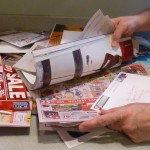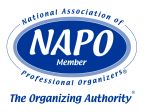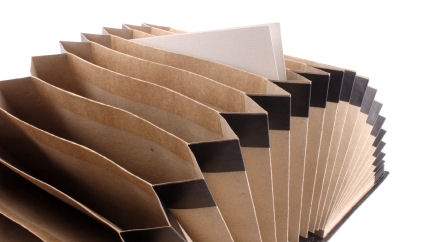Preventing Paper Clutter
 Even the most organized people have some amount of paper clutter. It’s difficult not to, because paper comes into our space on a steady, regular basis. Practically every time we walk into our home, we bring more paper into it, either intentionally or unintentionally. So, how can we prevent that paper from taking over and prevent those piles from happening?
Even the most organized people have some amount of paper clutter. It’s difficult not to, because paper comes into our space on a steady, regular basis. Practically every time we walk into our home, we bring more paper into it, either intentionally or unintentionally. So, how can we prevent that paper from taking over and prevent those piles from happening?
The simplest way to reduce paper clutter is to stop paper from coming into our space in the first place. One way to accomplish this is to go paperless with bank and credit card statements, and don’t print them out. Another suggestion is to not print emails, recipes, or other information from your computer, instead store and organize the information on your computer. A few other suggestions are to remove you name from as many mailing lists as you can, stop mail on all magazines and catalogs you don’t read, read the newspaper on-line, use your phone or another device for coupons and tickets instead of printing them, and have a paper recycle bin in the garage and toss as much paper as you can before entering the house.
Another way to reduce paper clutter is to allow each piece of paper to be in your home for the shortest possible time-frame. One way to accomplish this is to immediately recycle or shred junk mail. Another suggestion is to recycle boxes, wrapping paper, envelopes, and other paper items that we intend to reuse but never do. A few other suggestions are to shred ATM slips after you’ve reconciled your bank account, jot down event details on your calendar and toss the invitation, send the greeting cards that you have on hand, and recycle catalogs and magazines after you receive the next issue.
One more way to reduce paper clutter is to have an exit strategy for paper files and stored information. An exit strategy is a predetermined guideline that you’ve established for particular papers, files or information. One exit strategy may be to recycle or shred your utility bills after you view the confirmed payment on the next bill. Another exit strategy may be to shred pay stubs after you receive your W2. Please keep in mind that the guidelines need to fall within your own personal comfort zone. If you have questions on how long to keep particular papers, files or information, please consult a Certified Public Account or an attorney.
©March 2015 Janine Cavanaugh,CPO® All rights reserved.




 Janine Cavanaugh, CPO
Janine Cavanaugh, CPO
 Janine Cavanaugh, CPO
Janine Cavanaugh, CPO



Leave a Reply
Want to join the discussion?Feel free to contribute!